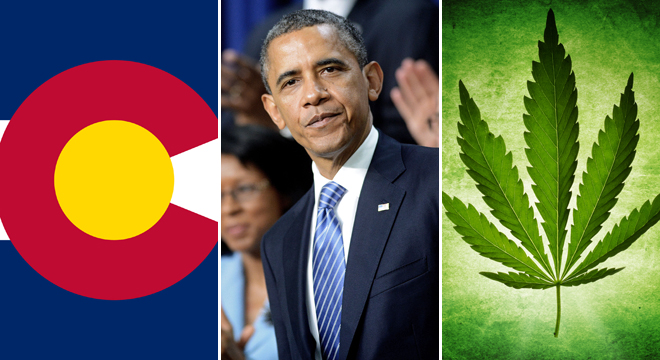Support is growing for a proposed Colorado amendment to legalize marijuana, a new poll released Wednesday shows, and the referendum could upend the former member of the Choom Gang who currently occupies the White House.
The latest survey from Democratic-leaning Public Policy Polling (PPP) shows that 47 percent of likely Colorado voters support Amendment 64, which will appear on the state ballot in November. That’s a small uptick since PPP’s June survey, which showed 46 percent support, but opposition to the measure is dropping. Only 38 percent of voters oppose Amendment 64 in Wednesday’s poll, down from 42 percent in June.
If passed, Amendment 64 would treat marijuana similarly to alcohol. Colorado adults 21 and over could consume and possess limited amounts of marijuana for personal use, while licenses would be provided to producers and sellers. The law would levy a tax on marijuana, with the first $40 million of the revenue generated to be earmarked for public school construction. Washington and Oregon will also vote on legalization measures in the fall, but most drug reform advocates believe that Colorado represents the best opportunity for an electoral breakthrough.
Mason Tvert, co-director of the Campaign to Regulate Marijuana Like Alcohol, isn’t surprised that Colorado voters are open to the amendment. The state has been ground zero for the legalization movement, he said. Voters passed an amendment in 2000 to allow the use of medical cannabis, which Tvert said is now used by roughly 100,000 Coloradans. In 2005, Denver became the first major American city to legalize small amounts of marijuana.
“This is an issue that has been at the forefront here for years,” Tvert told TPM. “People are pretty educated about it. You’ll see people who have not traditionally followed the issue — a woman in her mid-40s, mid-50s, mother of two — who are familiar with the details of our state’s medical marijuana laws and aware of the flaws of marijuana prohibition.”
Tvert insists that the pro-amendment campaign is strictly non-partisan and has no intention of endorsing any candidate, but no ballot measure exists in a vacuum. Colorado is a battleground state that both candidates have targeted, so the presidential contest there and the campaign surrounding Amendment 64 will invariably overlap — even if the candidates themselves never touch the issue.
Tvert believes that the amendment will drive turnout, although the campaign has conducted no voter registration efforts. On paper, a spike in turnout among a natural liberal constituency — including 18- to 29-year-olds who overwhelmingly support the amendment and helped power Obama’s win in Colorado four years ago — should benefit the president. But the Obama administration has disappointed drug reform advocates with an intensified crackdown on medical cannabis providers in states where it is legal, and Tvert is quick to remind that there are other presidential candidates on the ballot.
“There is a third-party candidate who’s actually supportive of marijuana policy reform, so Gary Johnson provides an option to some voters who feel strongly about this issue,” Tvert said.
Tvert might have a point about Johnson’s effect on the race in Colorado. PPP on Tuesday showed the former Republican governor of New Mexico who is running for president on the Libertarian ticket claiming 6 percent support among likely Colorado voters. That’s still a low level of support, but it’s enough to impact the prospects of both major-party candidates. For example, PPP showed Obama leading Romney by 6 points in a head-to-head match-up but only 4 points when Johnson is in the mix.
A poll released Wednesday by Quinnipiac University, CBS News and the New York Times showed Romney leading Obama in Colorado, 50 percent to 45 percent. That match-up didn’t include Johnson, an indication that Obama already has his hands full in a state he carried by a 9-point margin over Sen. John McCain (R-AZ) in 2008. The PollTracker Average currently shows a toss-up in Colorado, with Obama nursing a negligible lead over Romney, 47 percent to 46.8 percent.
Johnson’s supporters are far more apt to support Amendment 64 than Obama or Romney voters. PPP’s latest release shows that 59 percent of respondents who gave the nod to Obama support the amendment, compared with only 27 percent of Romney supporters. A staggering 79 percent of Johnson voters, however, support Amendment 64.
“With Gary Johnson on the ballot, he’s a wild card,” Tvert said. “In a close race, he really could make a difference.”
Images from Shutterstock






